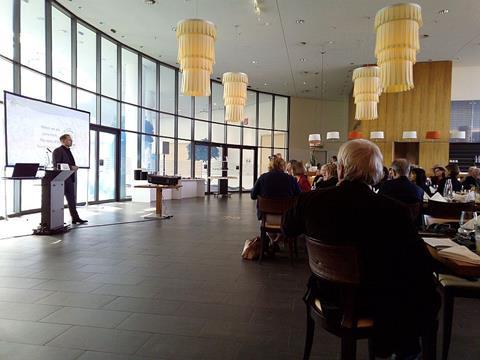
Immo Sander, Head of Packaging Development at Werner & Mertz, highlights the Recycling Initiative's sustainable packaging solutions at Fachpack.
In his keynote address on the second day of the fair, he pointed out the development achievements of the Recyclate Initiative as an example how material cycles can be kept closed and high quality and healthy secondary materials from plastics packaging can be used.
Plastic packaging faces up to increasing criticism. The new German packaging law, the European Union's circular economy package, and not least of all, consumer pressure are prompting manufacturers to rethink and optimize the design of plastic packaging, so that the plastic can be reused. Since 2012, the Recyclate Initiative has promoted the idea that plastic is a valuable material which must be used over and over in a circular economy.
Instead of the usual linear use of raw materials (cradle to grave), the Initiative pursues circular use of raw material in keeping with the Cradle-to-Cradle© principle. It conserves valuable resources and also protects the environment. To that end, the material for packaging and the cleaning solution from Werner & Mertz are returned again and again to a closed system.
With the Recyclate Initiative's successful developments, Sander showed that it is possible to establish a functioning material cycle for plastic along the entire supply chain with constructive cooperation from everybody involved. In recent years, the Recyclate Initiative has demonstrated how previously untapped sources of secondary material like the Yellow Bag, used to collect waste to be recycled in Germany, can be used for material recycling.
"In collaboration with our partners, we have proven that it is possible to develop bottles and caps made of 100% recycled PET, HDPE and PP," Mr. Sander says.
The Recyclate Initiative's portfolio of innovations includes the development of Frosch bottles of 100% recycled PET, and the world's first rHDPE packaging and rPP caps - both of 100% consumer plastic from the Yellow Bag.
The newest development is a completely recyclable standing pouch and the development of cradle-to-cradle certified masterbatches for coloured caps, sustainable printing inks and recycling-optimized labelling solutions.
The design is key
"The recyclability of packaging has to be taken into consideration in the packaging design. 'Healthy' materials, i.e. plastics sorted according to origin, and environmentally compatible ingredients, are absolute prerequisites for a functioning circular economy, as is the recyclability of packaging after its usage phase," says Mr. Sander.
"The recyclability of plastic is first made possible with the manufacture of sortable plastic packaging. The design for recycling includes the design of (recycled) plastic that can be sorted by origin, sustainable masterbatches, printing inks and removable labels. When packaging is designed to be recyclable, it is easier to separate different types of plastic cleanly and then offer a truly reusable material to the recycling industry."
A recyclable standing pouch
Werner & Mertz recently cooperated with Mondi to create a fully recyclable standing pouch of polyethylene with a removable label, designed according to cradle-to-cradle© principles.
"With this groundbreaking design for recycling, we have taken a giant step for closed-loop circulation of plastic packaging. The patented standing pouch will be used as flexible packaging for Frosch products, starting in 2019. After use the pouch can be recycled 100% into a recyclate of nearly the same quality as the source material.













